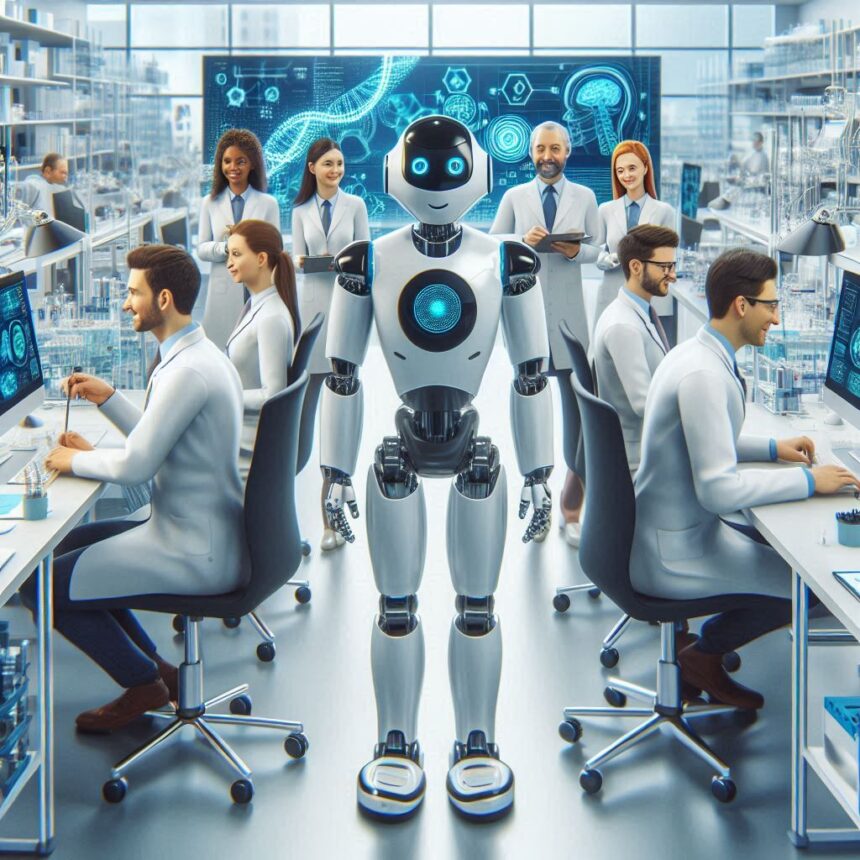In a groundbreaking move poised to transform biomedical research, Google has introduced an artificial intelligence (AI) tool known as the “co-scientist.” This innovative AI laboratory assistant is designed to augment researchers’ capabilities by identifying gaps in scientific knowledge and generating novel hypotheses, thereby accelerating the pace of scientific discovery.
Bridging Knowledge Gaps with AI
The co-scientist operates by deploying multiple AI agents that simulate various scientific processes. These agents retrieve and analyze data from a vast array of scientific papers and databases, enabling the AI to pinpoint areas where knowledge is lacking and propose new avenues for exploration. This approach not only streamlines the research process but also enhances the depth and breadth of scientific inquiry.
Collaborative Successes with Prestigious Institutions
Early trials of the co-scientist have yielded promising results, particularly in collaborations with esteemed institutions such as Stanford University and Imperial College London. In one notable instance, the AI tool was tasked with analyzing gene transfer mechanisms. Remarkably, it matched the conclusions of a confidential study, demonstrating its potential to independently verify complex scientific findings. Additionally, in research focused on liver fibrosis, the co-scientist proposed effective drug candidates that were subsequently validated by Stanford scientists. These successes underscore the AI’s capability to contribute meaningfully to cutting-edge biomedical research.
A Technological Shift in Scientific Methodology
The introduction of the co-scientist signifies a broader technological shift in scientific methodology. By leveraging advanced AI to assimilate and analyze the ever-expanding body of scientific literature, researchers can navigate complex datasets more efficiently. This capability is particularly crucial in an era where the volume of scientific information is growing exponentially, often outpacing the capacity of human researchers to keep abreast. The co-scientist addresses this challenge by serving as a tireless assistant, capable of processing and synthesizing vast amounts of information to inform and guide research efforts.
Enhancing, Not Replacing, Human Collaboration
While the co-scientist represents a significant advancement in AI-assisted research, it is designed to enhance rather than replace human collaboration. The tool functions as a virtual collaborator, facilitating the synthesis of extensive scientific literature and aiding in the generation of new hypotheses. Its role is to augment the expertise of human researchers, providing them with powerful tools to accelerate discovery and innovation. This collaborative dynamic ensures that the intuition, creativity, and critical thinking inherent to human scientists remain central to the research process.
The Role of DeepMind in Advancing AI for Science
Google’s AI division, DeepMind, has been instrumental in the development of the co-scientist. DeepMind has a storied history of pioneering AI solutions for complex scientific challenges. Notably, its development of AlphaFold, an AI system capable of predicting protein structures with remarkable accuracy, earned its creators, Demis Hassabis and John Jumper, the Nobel Prize in Chemistry in 2024. This accolade underscores DeepMind’s commitment to leveraging AI for scientific advancement and highlights the potential of AI-driven tools to revolutionize various fields of research.
The Broader Implications of AI in Scientific Research
The advent of AI tools like the co-scientist is part of a larger trend wherein artificial intelligence is increasingly integrated into scientific research. AI’s ability to process and analyze large datasets at unprecedented speeds enables researchers to uncover patterns and insights that might otherwise remain hidden. For instance, AI-driven platforms are being utilized to design synthetic proteins for potential use in antibody treatments, expediting the drug development process and reducing associated costs. These applications demonstrate AI’s potential to transform not only biomedical research but also fields such as energy, materials science, and environmental studies.
Ethical Considerations and Future Directions
As AI becomes increasingly integrated into the scientific process, it is imperative to address the ethical and societal implications of this technology. Ensuring transparency in AI decision-making processes, maintaining data privacy, and preventing biases in AI-generated hypotheses are critical considerations. Moreover, fostering interdisciplinary collaboration between AI developers, ethicists, and domain-specific scientists will be essential in navigating the complex landscape of AI-assisted research. By proactively addressing these challenges, the scientific community can harness the full potential of AI to drive innovation while upholding ethical standards.
Conclusion
Google’s introduction of the AI co-scientist marks a significant milestone in the evolution of scientific research. By augmenting human expertise with advanced AI capabilities, this tool has the potential to accelerate discoveries, enhance collaboration, and transform the methodology of scientific inquiry. As AI continues to evolve, its integration into research processes promises to unlock new frontiers of knowledge and innovation, heralding a new era of scientific exploration.
References
Financial Times. (2025, February 19). Google builds AI ‘co-scientist’ tool to speed up research. Retrieved from https://www.ft.com/content/6e53cc55-9031-4ba4-9e7c-e5e9c02b3203
Reuters. (2025, February 19). Google develops AI co-scientist to aid researchers. Retrieved from https://www.reuters.com/technology/artificial-intelligence/google-develops-ai-co-scientist-aid-researchers-2025-02-19/
Financial Times. (2025, February 13). Ex-DeepMind scientist launches AI drug discovery venture. Retrieved from https://www.ft.com/content/92143d49-c777-4bba-8857-b4ef7e82ebd4
The Times. (2025, February 13). Google star raises $50 million to use AI to design proteins. Retrieved from https://www.thetimes.co.uk/article/google-star-uses-ai-to-design-proteins-enterprise-network-6vrp06xqk
The Nobel Prize. (2024, October 9). Press release: The Nobel Prize in Chemistry 2024. Retrieved from https://www.nobelprize.org/prizes/chemistry/2024/press-release/
